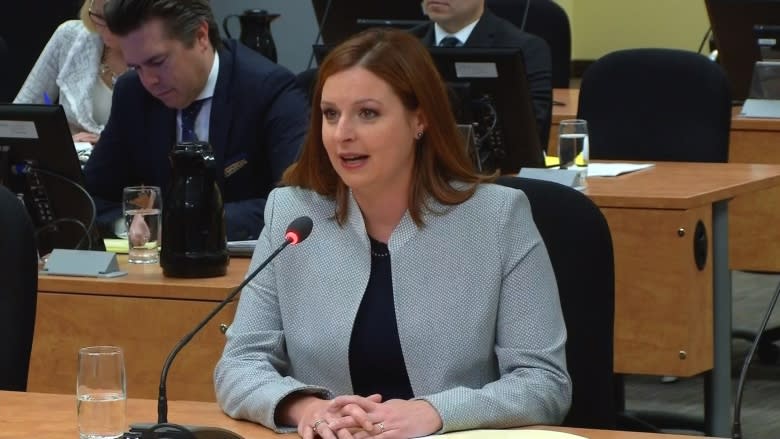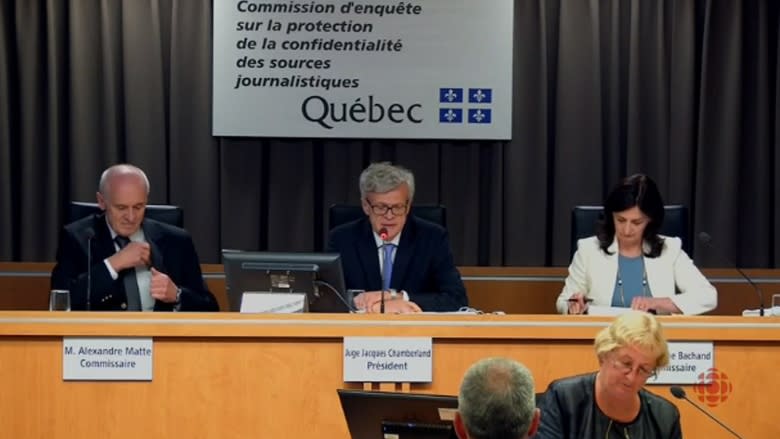Crude language and dubious evidence: What we've learned from the inquiry into police surveillance
An inquiry into police surveillance of Quebec journalists has raised questions about how law enforcement in the province secures court authorization for their investigations.
The so-called Chamberland commission — after its presiding judge, Jacques Chamberland — wrapped up its proceedings this week before taking a summer break.
Since hearings began in April, the commission has probed how it came to be that at least eight journalists were spied on by police in recent years.
Testimony heard so far suggests the journalists came under surveillance as part of internal police investigations into sources of leaked information.
But the commission also heard that, in carrying out these investigations, police included questionable evidence in their applications for warrants.
Here are some of the more explosive revelations the commission heard this spring.
Crude terms, gossip included in police records
When Laval police began investigating, in 2014, how 98.5 FM reporter Monic Néron accessed sensitive information, investigators hypothesized she was having a sexual relationship with a member of the anti-gang unit.
The officer investigating the leak, Hugues Goupil, read text messages she exchanged with her source. None of these, Goupil told the commission, suggested any kind of sexual relationship.
But despite the lack evidence of a relationship, Goupil nevertheless included his suspicion in two affidavits filed subsequently in order to secure additional warrants in the case.
The commission, moreover, heard that the initial police report outlining the rumour contained the terms "wanted to f--k her" and was "thinking with his d--k."
"These are terms worthy of a Neanderthal," Neron said following the revelations. "I don't think if the name was Patrick Lagacé, Félix Séguin and Claude Poirier they would have dared write that way."
And yet more gossip to justify surveillance
A few days later, the commission heard testimony that Quebec provincial police made a similar assumption about Marie-Maude Denis, one of Radio-Canada's leading investigative journalists.
In 2014, the Sûreté du Québec was investigating how several journalists were getting information about its investigation into corruption in the province's construction industry.
Those heading the investigation into the leaks believed Denis was having an "intimate relationship" with the head of the corruption investigation, Denis Morin.
That allegation — denied by both Denis and Morin — was included in documents the SQ filed in court to obtain warrants to place six journalists under surveillance.
"What questions were asked by the investigators to verify this coffee-machine gossip?" Denis said during her testimony last week.
Concerns about tower dumping
Early in commission testimony, representatives of several cellphone companies revealed the extent of their collaboration with police surveillance.
Since 2010, these companies have cooperated with some 20,000 court-authorized requests from Quebec police forces.
Before legal reforms in 2014, Telus said it gave the SQ and Montreal police access to client information even without a warrant.
Quebec's access to information commission (CAI) expressed concern about these practices, in particular about what's known as "tower dumping."
Police are able to seek warrants that gives them access to all metadata that transits through a cellphone tower during a fixed period of time.
But CAI lawyer Catherine Armand said the practice means that innocent third parties, including journalists, can have their cellphone data handed over to police.
Quebec's privacy laws limit the amount of information police can collect to only what is strictly necessary to their investigation.
Armand questioned what definition of "necessary" police are using given how much data they receive.
Little training
Several officers involved in investigations that targeted journalists admitted they had little knowledge of the legal rules surrounding police surveillance of journalists.
There are at least three Supreme Court of Canada decisions that outline how police should interact with journalists and their sources.
One Montreal police officer, Normand Borduas, said he was only made aware of these decisions by a Crown prosecutor after he obtained the phone records of a La Presse journalist.
The head of the provincial police academy, Paulin Bureau, told the inquiry that there is currently no course that deals with the protection of journalistic sources.




